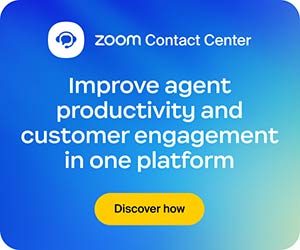Believe it or not, your agents may often come to meetings and training sessions with a fair amount of trepidation.
This is because, whilst you view such events as an opportunity to upskill your staff as a means to the beneficial end of improving your service and, ultimately, drawing in further customers, your advisors are more likely to see these sessions as a misuse of the precious time needed to meet their targets or, even worse, downright boring.
Read on for twelve easy ideas to keep your agents happy, engaged and productive during their meetings.
1. Open With Gratitude and Reassurances for Your Staff
First and foremost, it’s advisable to kick off the session by thanking your attendees for their presence. Assure them that their time is appreciated, thank them in advance for their participation, and remind them that their work targets for the day have been adjusted to take into account the time spent away from their desk.
This way, your advisors are likely to be focused more fully on the content of the meeting rather than how they’re going to make up for the lost time later.
2. Allow Agents to Share Any Updates, Thoughts and Concerns

Sure, your agents already know each other (if you’ve any new team members, see point 3, below), but it always helps get the mental juices flowing – and, as a bonus, build long-term team rapport – to let each member give an “opening statement” of their choice.
This could be anything at all, ranging from what they’ve been up to in their personal life, any recent workplace concerns, or what they hope to achieve from the session at hand. The result will be a relaxed, congenial atmosphere where the information you present will be more readily absorbed.
3. Introduce New Team Members and Allow Them to Introduce Themselves
If you do have a new team member, it’s always a good idea to give them an introduction, albeit a brief one, and allow them the opportunity to tell the group a little about themselves.
This could be anything from their personal hobbies to their previous work experience, or why they decided to join your company.
This will not only help pique the entire group’s interest for the duration of the session; it will also help iron out any tensions or inhibitions that can inevitably arise when a new member of staff enters a team.
Do note, however, that it is important to do this without making your new member of staff feel uncomfortable or “on the spot”. If you do, the biggest takeaway from the session won’t be an enthused and informed workforce but rather a severe case of New Pupil Syndrome for your unfortunate new employee.
In most cases, new starters are an asset to a team; read our article 10 Red Flags to Watch Out for With New Hires to find out what to watch out for with new hires.
4. Bring Your Agents Up to Speed With a Brief Recap
As much for the benefit of your new employees as for your long-term staff, it’s important, before you begin, to briefly and concisely recap the major points and outcomes of your previous meeting.
Let’s face it, we’ve all lapsed into daydream mode at some point in our meeting-going careers; we’re all human, and it’s one of the most natural (and, at times, fruitful) things in the world when our imaginations begin to wander. Important business meetings, though, are rarely the ideal setting for this.
Fortunately, you can prevent it from happening by ensuring that the meeting kicks off on a level, up-to-date footing, where all attendees have their necessary bearings.
5. Use Memorable Multimedia and Thought-Provoking Materials
Now that you’re all caught up and have a good foundation for the ensuing meeting, it’s time to get creative by interweaving any multimedia tools at your disposal into the session. Music, videos, screenshots of relevant social media posts – all of these will give your meeting the character it needs in order to be a positive and memorable experience for its attendees.
Two side notes, however: it is important to ensure that
- Any of the aforementioned social media posts are of genuine interest (think: a positive review which mentions a team member by name, rather than a generic comment regarding the company as a whole); and,
- If you’re giving your meeting a character, make that character shine – for example, you could apply a gentle sense of humour by having a pre-agreed “team anthem” track play at the beginning and end of the session.
Be warned, though: choose carefully. Go for the wrong music – hotel reception muzak would be an obvious example – and you’ll have those at the back drifting off sharpish.
6. Reward Attention With Incentives
Whilst the latest technological bells and whistles can work wonders in maintaining agents’ attention, the unfortunate truth is that, deep down, the most powerful incentive is often a tangible one.
This is as true to us as individual people as it is to the society of which your team is a microcosm, so be sure to give your session’s attendees a definite and palpable reason for paying attention.
This might take the form of a quiz based on the session’s contents, to be held towards its end – the winner could receive a day of annual leave on their birthday, an afternoon shadowing in a department of their choice, or even just an extra half-hour break on a day of their choosing.
If you are looking for incentive ideas to motivate and reward your team, read our article: 100 Great Staff Incentives to Motivate Your Team
7. Use Bright, Colourful Pie Charts and Vivid Pictograms
Whether it’s a training session or a general business update, showcasing slide after slide of dreary, soulless graphs and screenshots is unlikely to enthuse your audience.
This isn’t to say that detailed information should not be conveyed, but rather that this should be done in inventive, thought-provoking ways that stimulate the senses. Bright, colourful pie charts and animated pictograms win over traditional spreadsheets and text-heavy paragraphs, any day.
8. Check Your Equipment in Advance
This may seem a no-brainer, but do make sure to turn up to your meetings with all of the materials and notes you’ll need, and ensure that any equipment you plan to use is tested beforehand, so as to prevent any unnecessary kerfuffle and preserve your reputation as an organized and efficient individual.
If you come ill-prepared, your staff are likely to lose confidence in your efficiency and, as a natural consequence, pay less attention to what you have to say – both in the present situation and, worryingly, thereafter.
9. Keep Sessions as Compact, Informative and Concise as Possible
It is best to structure your meeting intelligently and to keep your points concise.
Being upfront with your attendees as to the agenda of the meeting, and how long it will last, will help prepare them mentally to devote their concentration to you for the given time.
Do ensure that you are realistic with them, however; if you over-run the agreed time by more than a few minutes, their attention will quickly begin to decline.
With this in mind, it is best to structure your meeting intelligently and to keep your points concise, so that more information can be effectively presented in as short a time as possible
10. Take Regular Breaks, Keep Active and Keep Brain Fuel to Hand
Even the most enthusiastic, caffeine-happy employee’s patience is not unlimited. Listening and taking notes for extended periods of time is draining work – as, of course, is presenting information; after an hour or two’s concentration, your agents’ focus, as well as your own, is almost certain to wane.
To keep yourself and your agents fresh, be sure to give frequent breaks – fifteen minutes every two hours is a very good rule of thumb – and consider keeping refreshments and a water jug handy. A dehydrated brain is, after all, a non-optimal one when it comes to taking in new information.
For very short sessions up to twenty minutes long, it can be useful to have staff stand, rather than sit, throughout.
This is because when standing, their bodies and minds will tend to be less prone to excessive relaxation, making them more alert as a result. But do be cautious with this approach, and avoid it completely if any of the team are disabled or suffering from injuries.
11. Show That You Care by Following Up on the Last Meeting’s Staff Requests

Earlyish in the session, be sure to demonstrate how you have listened to and taken action on any concerns your attendees brought up at the previous gathering.
What progress have you made towards fixing that IVR script your customers keep complaining about, or developing the new bonus scheme, or replacing the refreshments machine which broke down last month?
When your team members know that you honestly care about and will address the concerns they raise, they’ll be far more likely to return the favour with increased attention and engagement throughout this – and future – meetings.
12. Allow Your Staff a Hand in Shaping the Next Session’s Agenda
As the session draws to a close, be sure to show your appreciation by inviting all agents to ask questions, share feedback and – most importantly – help set the agenda for your next meeting.
If your staff members understand that their input and advice are appreciated, and that they can help shape the future of the business, they will be more likely to look forward to and engage in the next meeting.
Remember: when your staff begin to feel like faceless and irrelevant cogs in the machine, their enthusiasm in all respects will drop. The reality is that they truly are experts in their field, and deserve to know that you know it, too.
You know your team better than most; if there are any particularly shy agents among them, it is highly advisable not to hold an ice-breaking session at all. If you do, your shy sharers will begin to dread and, ultimately, resent your group gatherings, making them highly unproductive for all concerned.
Thanks to George Dixon for this insightful article.
If you want to find out more about ways to motivate your agents and keep then engaged, read these articles next:
- 16 New-Age Ideas for Inspiring a Young Workforce of Super-Agents
- Contact Centre Motivation – How to Reward, Empower and Inspire Advisors
- 10 Ways to Improve Your Team Meetings
- 50 Call Centre Training Tips
Author: Robyn Coppell
Published On: 9th Feb 2022 - Last modified: 28th Jun 2024
Read more about - Call Centre Management, Editor's Picks, Employee Engagement, George Dixon, Team Management, Training





































